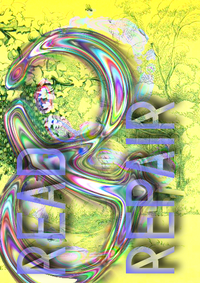From August 2022 to January 2023, Varia Library and Rotterdam Electronica Depot hold Read & Repair events on the last Saturday of every month. We invite you to visit our space, make yourself comfortable, read or repair some things together, and share thoughts and ideas. For these events a vegetarian lunch prepared by Sara Hamadeh will be served in the hour between workshops.
For this month, we will be exploring the theme Vegetality and Virtuality.
READ
Date: Saturday, 27th August 2022
Time: 11:00-13:00 CEST
Location: Varia (Gouwstraat 3, Rotterdam) + Online (https://bbb.constantvzw.org/b/cri-hgz-jrl-aqp/)
LUNCH
13:00 - 14:00 we share a free, catered lunch. Please email us if you have any dietary restrictions at readandrepair@varia.zone.
REPAIR
Date: Saturday, 27th August 2022
Time: 14:00-16:00 CEST
Location: Varia (Gouwstraat 3, Rotterdam)
READ
The title comes from the work of Georgiana Cojocaru. In the Read session with Georgiana Cojocaru, we will discuss what are the virtual, fragile and always threatened possibilities for recovery of a body which is considered beyond repair, beyond any semblance to a former self. What attracts possibilities for re-knowing and re-ordering a living being ? How does a shattered mind move? When the poetic act tries to stay within this state, map its ambiance, its pulsations, its circuitous rhythms what kind of creations emerge? How close is poetry to sentience? How could a stuttering, nervous awareness ordain itself into a virtual possibility: a story, a new plot, an impermanent thought that might materialize into a newborn possibility? Moreover, how do isomorphic, architectural aspects of the body premise said virtuality via poetry? When the body is in pain and needs to operate in chaotic/ traumatic contexts, how and why is poetic intention summoned?
In the writings of Michel Marder, vegetality constitutes plants’ ways of inhabiting chance and threat through grace. Vegetality is an infinity in itself, the healing texture after the violence that changes the forest. Through means of analogy (a trait of poetry itself) poetry attempts to design within and outside the perceptual realm, conceptualize it and then reciprocate it with new meanings and new ways of inhabiting a space and time. It attempts to delineate a new physics where elements are sought after for their rhythms, their cadences, their electric charges. Poetry is perhaps a new way of imagining gravity, a pulsation that tries to redefine it. Poeple who are caught in diasporic movements (involuntary, traumatic, life shattering) shaped by the forces of life, luck and bureaucratic technologies which come into play write this poetry of impossibility with every day they manage to survive. All these forces mutate or mutilate life trajectories, modify or mute voices, bringing with them unforeseen potential or annihilation. In the Read session with Georgiana Cojocaru, we will discuss these two notions, and the parallels between them.
Texts:
Primary
- Michel Serres: The Incandescent, Translated by Randolph Burks. Bloomsbury Academic, 2018.
- Olga Goriunova & Matthew Fuller: Bleak Joys, Aesthetics of Ecology and Impossibility, University of Minessota Pres, 2019
Secondary/ Excerpts from
- Baoshu: “What has passed shall in kinder light appear”
- MODERN SUDANESE POETRY AN ANTHOLOGY. Translated and edited by Adil Babikir. University of Nebraska Press / Lincoln, 2019
- Michael Marder and Anaïs Tondeur: "The Chernobyl Herbarium: Fragments of an Exploded Consciousness"
Georgiana Cojocaru (RO) is a poet, researcher and writer. She is the co-founder of Morphic Minds, a clandestine school temporarily located at the HvA, University of Applied Sciences Amsterdam and exploring artificiality and intelligence, locality and cosmos, language and poetry. She is studying for a graduate certificate in Transdisciplinary Studies with the New Centre for Research and Practice.
REPAIR
During the Repair session, Bérénice Staiger takes us through her interest in bees and the swarm in particular. Bérénice also introduces meditative exercises for relaxation.
The beeswarm is a superorganism that describes the entire beehive as one entitiy. In Dutch the beeswarm is called an 'imme'. This is a historical term for the superorganism of a bee colony, wherein honeybees all live together, in other words: all the animals of a beehive. This superorganism has developed skills that the inidivual organisms do not have. An example: While insects are cold blooded animals, they can, just like warmblooded animals control the temperature of the entire group. This type of community is called a swarm or colony and is organized differently. In the 20th century, the term superorganism was introduced for the developed communities of ants and bees. The bee community consists of individual organisms and coordinates their activities - similar to an organism - via signal substances. Individual bees and specialized groups can only survive as a whole community.
Nature has a soothing effect on our senses and brain. It is nice to spend time in a green environment on a daily basis. When we do that, we can relax more easily and feel better.
During the Repair session Bérénice will guide us to relax through sensory exercises. For this she uses simple instructions and as an extra she takes products that bees collect in nature: honey, propolis and pollen. We will feel, smell, and taste the products. We will also go outside to experience our surroundings with our senses.
Bérénice Staiger (DE) is an artist and art and yoga educator for children and grownups and a beekeeper. She is interested in working in and with groups to investigate a wide range of ideas and experiences connected to the same theme. Atelier Bérénice Staiger is a place where you can play, discover and experiment.
Our August 2022 to January 2023 programme is funded by Gemeente Rotterdam.
